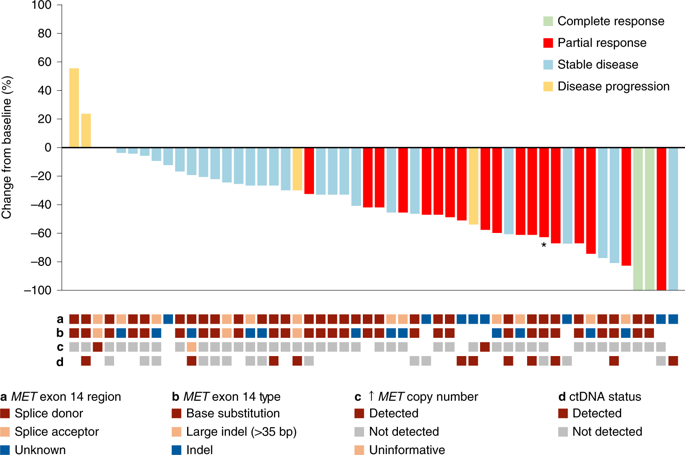Nature Medicine ( IF 58.7 ) Pub Date : 2020-01-13 , DOI: 10.1038/s41591-019-0716-8 Alexander Drilon 1, 2 , Jeffrey W Clark 3 , Jared Weiss 4 , Sai-Hong Ignatius Ou 5 , D Ross Camidge 6 , Benjamin J Solomon 7 , Gregory A Otterson 8 , Liza C Villaruz 9 , Gregory J Riely 1 , Rebecca S Heist 3 , Mark M Awad 10 , Geoffrey I Shapiro 10 , Miyako Satouchi 11 , Toyoaki Hida 12 , Hidetoshi Hayashi 13 , Danielle A Murphy 14 , Sherry C Wang 15 , Sherry Li 14 , Tiziana Usari 16 , Keith D Wilner 14 , Paul K Paik 1

|
MET exon 14 alterations are oncogenic drivers of non-small-cell lung cancers (NSCLCs)1. These alterations are associated with increased MET activity and preclinical sensitivity to MET inhibition2. Crizotinib is a multikinase inhibitor with potent activity against MET3. The antitumor activity and safety of crizotinib were assessed in 69 patients with advanced NSCLCs harboring MET exon 14 alterations. Objective response rate was 32% (95% confidence interval (CI), 21–45) among 65 response-evaluable patients. Objective responses were observed independent of the molecular heterogeneity that characterizes these cancers and did not vary by splice-site region and mutation type of the MET exon 14 alteration, concurrent increased MET copy number or the detection of a MET exon 14 alteration in circulating tumor DNA. The median duration of response was 9.1 months (95% CI, 6.4–12.7). The median progression-free survival was 7.3 months (95% CI, 5.4–9.1). MET exon 14 alteration defines a molecular subgroup of NSCLCs for which MET inhibition with crizotinib is active. These results address an unmet need for targeted therapy in people with lung cancers with MET exon 14 alterations and adds to an expanding list of genomically driven therapies for oncogenic subsets of NSCLC.
中文翻译:

克唑替尼对携带 MET 外显子 14 改变的肺癌的抗肿瘤活性
MET外显子 14 改变是非小细胞肺癌 (NSCLC) 的致癌驱动因素1 。这些改变与 MET 活性增加和对 MET 抑制的临床前敏感性增加有关2 。 Crizotinib 是一种多激酶抑制剂,具有有效的 MET 3活性。在 69 名携带MET外显子 14 改变的晚期 NSCLC 患者中评估了克唑替尼的抗肿瘤活性和安全性。 65 名可评估疗效的患者中,客观缓解率为 32%(95% 置信区间 (CI),21-45)。观察到的客观反应与这些癌症特征的分子异质性无关,并且不因MET外显子 14 改变的剪接位点区域和突变类型、同时增加的MET拷贝数或循环肿瘤 DNA 中MET外显子 14 改变的检测而变化。中位缓解持续时间为 9.1 个月(95% CI,6.4-12.7)。中位无进展生存期为 7.3 个月(95% CI,5.4-9.1)。 MET外显子 14 改变定义了克唑替尼对 MET 抑制有效的 NSCLC 分子亚组。这些结果解决了具有MET外显子 14 改变的肺癌患者对靶向治疗未得到满足的需求,并增加了针对 NSCLC 致癌亚型的基因组驱动疗法的不断扩大的列表。











































 京公网安备 11010802027423号
京公网安备 11010802027423号